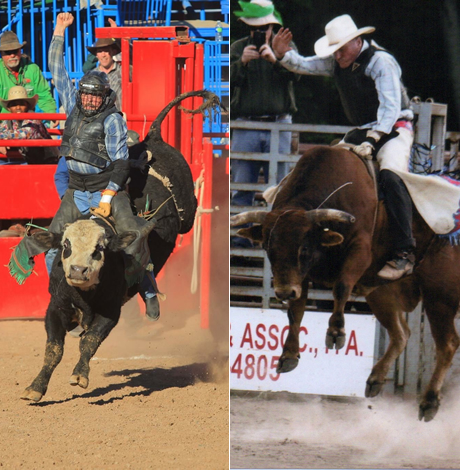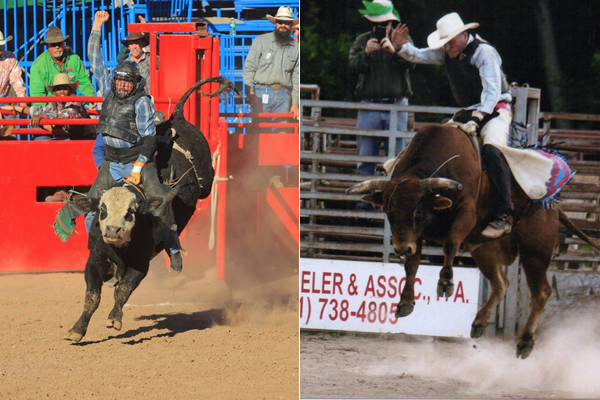Sports
Gay rodeo veterans find adrenaline, family in circuit
Two legends on the International Gay Rodeo Association circuit to compete


Wade Earp, left, and Sonny Koerner compete with the International Gay Rodeo Association. (Photos courtesy the subjects)
Two legends on the International Gay Rodeo Association circuit will compete at the 30th anniversary World Gay Rodeo Finals this weekend in Las Vegas. The competition will feature the top 20 competitors on the Association circuit in 13 events. The finalists are determined by points accumulated over roughly 14 rodeos throughout the United States and Canada this past year.
On a beautiful morning on a ranch outside of Dallas, it’s feeding time and the animals are producing a loud symphony for their owner. Wade Earp apologizes for the background noise.
“The birds are going crazy this morning,” says Earp, “and it always makes the other animals frisky.”
Along with his partner, Earp raises ducks, geese, chickens, Bobwhite quail, donkeys and small breed goats. He says his whole life is farming and ranching. Oh and there’s that rodeo thing too.
Raised in Texas and Arkansas, Earp thrived in sports including baseball, soccer, softball, volleyball and basketball where he was all-state. His road to being a rodeo competitor is a journey that includes two older brothers who competed, competitive two-step dancing and a lifelong love of animals. Also, his father was a fireman and the fire department hosted the local rodeo every year.
Earp’s first gay rodeo event was barrel racing in 1999 and since then, he’s been a fixture on the gay rodeo circuit. In 2014, he was one of the featured cowboys in the film documentary, “Queens and Cowboys.” His accomplishments are too numerous to list here, but include the Association World Gay Rodeo Finals all-around cowboy and a Gay Games gold medal.
At this year’s finals, Earp has qualified for nine out of 13 events. He retired from bronc riding last year, but at 50 is still going strong in other events. He says he’s too hooked on the camaraderie of the gay rodeo circuit to consider retiring.
“I wish it wasn’t about gay or straight, but rodeo is very machismo. It’s tough to be an out gay rodeo competitor outside of this circuit,” Earp says. “There is such a family atmosphere here, especially with the rough stock competitors. It’s a place where people loan each other gear and help tie each other in in the chute.”
Earp is a direct descendant of the Earp brothers who gained fame from their Gunfight at the O.K. Corral. He tracked his link back to Virgil Earp when Time Life presented a family tree.
“It’s a tough name to live up to,” says Earp, “but I haven’t had it half as bad as my brother, Wyatt.”
Sonny Koerner remembers giggling the first time he saw men two-stepping together at Remington’s back in the early ‘90s. He would go on to become one of the first D.C. Cowboys. Earlier in his life he had been determined to become the first member of his family to become a rodeo competitor to follow in the footsteps of his grandfather, who was the main male influence in his life.
Koerner grew up in multiple locations as a part of a military family, but spent a lot of time at his grandparent’s cattle ranch in Victoria, Texas. He started competing in junior rodeos at age 12 and has been competing off and on ever since.
He has been in the D.C. area since being stationed here in the early ‘90s during his military stint and now runs a consulting firm along with his partner. D.C. is not known to be a hotbed for rodeo, but he was pulled back into the sport after attending his first gay rodeo.
“I was kind of in tears as I sat in the stands and watched my first gay rodeo,” Koerner says. “I had not married both sides of my life; rodeo and being gay. The opposing sides of me were coming together. It was a cathartic.”
Koerner competed in his first gay rodeo in 1993 and has competed in all four categories, though he has focused on rough stock events: bull riding, steer riding, steer wrestling and bareback bronc riding.
Now approaching 50, he has retired from bronc riding and has qualified for this year’s finals in the three other rough stock events and three camp events. The rough stock events can be brutal and require an elevated level of athleticism from the competitors.
Early on, Koerner excelled at sports such as track & field, basketball and football. He went to the University of Alabama on a track scholarship and is a 14-time medalist in track & field at the Gay Games along with winning a medal in steer riding. He says he has maintained his fitness all along to help with his rodeo events.
“There is a threshold that you cross in this sport in terms of training,” Koerner says. “Eventually it becomes more about knowledge, fitness and core.”
The prospect of retiring is definitely in Koerner’s crosshairs, but like his performances on bulls, he’s hanging on. He still loves it and he wants to help draw new people to the circuit. The Association is looking for new blood in the rough stock events to replace an aging core group and Koerner’s charisma is palpable.
“I have won plenty of buckles and I have plenty of awards. I still enjoy it, but I am past that point where I crave it,” Koerner says. “It’s the people that make up this rodeo family that are keeping me here. It’s more than the sport.”
Sports
US wins Olympic gold medal in women’s hockey
Team captain Hilary Knight proposed to girlfriend on Wednesday

The U.S. women’s hockey team on Thursday won a gold medal at the Milan Cortina Winter Olympics.
Team USA defeated Canada 2-1 in overtime. The game took place a day after Team USA captain Hilary Knight proposed to her girlfriend, Brittany Bowe, an Olympic speed skater.
Cayla Barnes and Alex Carpenter — Knight’s teammates — are also LGBTQ. They are among the more than 40 openly LGBTQ athletes who are competing in the games.
The Olympics will end on Sunday.
Sports
Attitude! French ice dancers nail ‘Vogue’ routine
Cizeron and Fournier Beaudry strike a pose in memorable Olympics performance

Madonna’s presence is being felt at the Olympic Games in Italy.
Guillaume Cizeron and his rhythm ice dancing partner Laurence Fournier Beaudry of France performed a flawless skate to Madonna’s “Vogue” and “Rescue Me” on Monday.
The duo scored an impressive 90.18 for their effort, the best score of the night.
“We’ve been working hard the whole season to get over 90, so it was nice to see the score on the screen,” Fournier Beaudry told Olympics.com. “But first of all, just coming out off the ice, we were very happy about what we delivered and the pleasure we had out there. With the energy of the crowd, it was really amazing.”
Watch the routine on YouTube here.
Italy
Olympics Pride House ‘really important for the community’
Italy lags behind other European countries in terms of LGBTQ rights

The four Italian advocacy groups behind the Milan Cortina Winter Olympics’ Pride House hope to use the games to highlight the lack of LGBTQ rights in their country.
Arcigay, CIG Arcigay Milano, Milano Pride, and Pride Sport Milano organized the Pride House that is located in Milan’s MEET Digital Culture Center. The Washington Blade on Feb. 5 interviewed Pride House Project Manager Joseph Naklé.
Naklé in 2020 founded Peacox Basket Milano, Italy’s only LGBTQ basketball team. He also carried the Olympic torch through Milan shortly before he spoke with the Blade. (“Heated Rivalry” stars Hudson Williams and Connor Storrie last month participated in the torch relay in Feltre, a town in Italy’s Veneto region.)
Naklé said the promotion of LGBTQ rights in Italy is “actually our main objective.”
ILGA-Europe in its Rainbow Map 2025 notes same-sex couples lack full marriage rights in Italy, and the country’s hate crimes law does not include sexual orientation or gender identity. Italy does ban discrimination based on sexual orientation in employment, but the country’s nondiscrimination laws do not include gender identity.
ILGA-Europe has made the following recommendations “in order to improve the legal and policy situation of LGBTI people in Italy.”
• Marriage equality for same-sex couples
• Depathologization of trans identities
• Automatic co-parent recognition available for all couples
“We are not really known to be the most openly LGBT-friendly country,” Naklé told the Blade. “That’s why it (Pride House) was really important for the community.”
“We want to use the Olympic games — because there is a big media attention — and we want to use this media attention to raise the voice,” he added.

Naklé noted Pride House will host “talks and roundtables every night” during the games that will focus on a variety of topics that include transgender and nonbinary people in sports and AI. Another will focus on what Naklé described to the Blade as “the importance of political movements now to fight for our rights, especially in places such as Italy or the U.S. where we are going backwards, and not forwards.”
Seven LGBTQ Olympians — Italian swimmer Alex Di Giorgio, Canadian ice dancers Paul Poirier and Kaitlyn Weaver, Canadian figure skater Eric Radford, Spanish figure skater Javier Raya, Scottish ice dancer Lewis Gibson, and Irish field hockey and cricket player Nikki Symmons — are scheduled to participate in Pride House’s Out and Proud event on Feb. 14.
Pride House Los Angeles – West Hollywood representatives are expected to speak at Pride House on Feb. 21.
The event will include a screening of Mariano Furlani’s documentary about Pride House and LGBTQ inclusion in sports. The MiX International LGBTQ+ Film and Queer Culture Festival will screen later this year in Milan. Pride House Los Angeles – West Hollywood is also planning to show the film during the 2028 Summer Olympics.
Naklé also noted Pride House has launched an initiative that allows LGBTQ sports teams to partner with teams whose members are either migrants from African and Islamic countries or people with disabilities.
“The objective is to show that sports is the bridge between these communities,” he said.
Bisexual US skier wins gold
Naklé spoke with the Blade a day before the games opened. The Milan Cortina Winter Olympics will close on Feb. 22.
More than 40 openly LGBTQ athletes are competing in the games.
Breezy Johnson, an American alpine skier who identifies as bisexual, on Sunday won a gold medal in the women’s downhill. Amber Glenn, who identifies as bisexual and pansexual, on the same day helped the U.S. win a gold medal in team figure skating.
Glenn said she received threats on social media after she told reporters during a pre-Olympics press conference that LGBTQ Americans are having a “hard time” with the Trump-Vance administration in the White House. The Associated Press notes Glenn wore a Pride pin on her jacket during Sunday’s medal ceremony.
“I was disappointed because I’ve never had so many people wish me harm before, just for being me and speaking about being decent — human rights and decency,” said Glenn, according to the AP. “So that was really disappointing, and I do think it kind of lowered that excitement for this.”

















